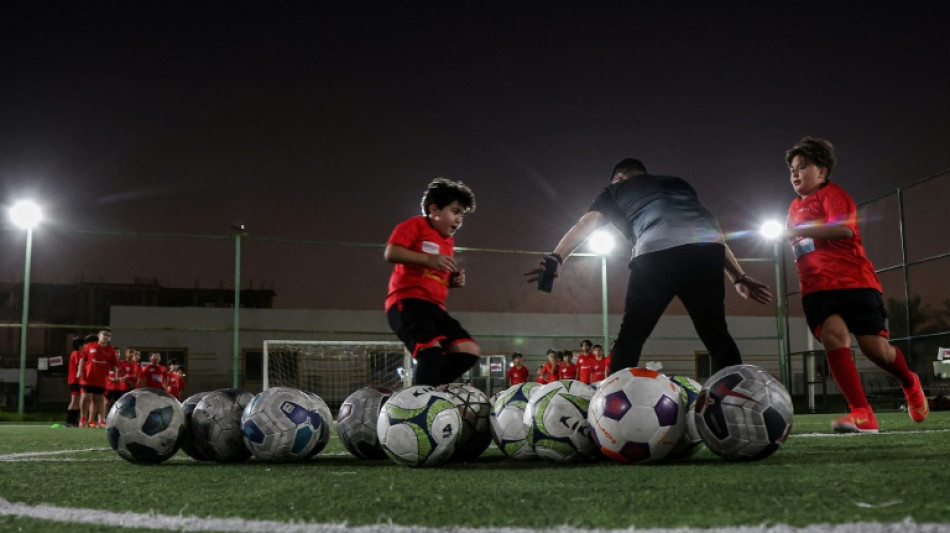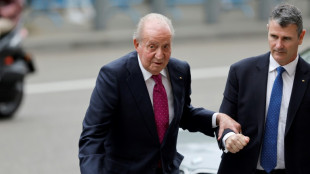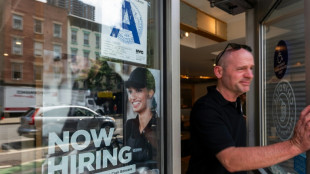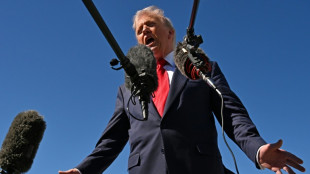
-
 Spain's exiled king recounts history, scandals in wistful memoir
Spain's exiled king recounts history, scandals in wistful memoir
-
Wall Street stocks steady after positive jobs data

-
 Trump blasts Democrats as government shutdown becomes longest ever
Trump blasts Democrats as government shutdown becomes longest ever
-
Indian pilgrims find 'warm welcome' in Pakistan despite tensions

-
 Inter and AC Milan complete purchase of San Siro
Inter and AC Milan complete purchase of San Siro
-
Swedish authorities inspect worksite conditions at steel startup Stegra

-
 Keys withdraws from WTA Finals with illness
Keys withdraws from WTA Finals with illness
-
Prince Harry says proud to be British despite new life in US

-
 EU strikes last-ditch deal on climate targets as COP30 looms
EU strikes last-ditch deal on climate targets as COP30 looms
-
Stocks retreat as tech bubble fears grow

-
 Shein opens first permanent store amid heavy police presence
Shein opens first permanent store amid heavy police presence
-
West Indies edge New Zealand despite Santner brilliance

-
 French pair released by Iran await return home
French pair released by Iran await return home
-
German factory orders up but outlook still muted

-
 Death toll tops 100 as Philippines digs out after typhoon
Death toll tops 100 as Philippines digs out after typhoon
-
Attack on key city in Sudan's Kordofan region kills 40: UN

-
 'No one could stop it': Sudanese describe mass rapes while fleeing El-Fasher
'No one could stop it': Sudanese describe mass rapes while fleeing El-Fasher
-
Champagne and cheers across New York as Mamdani soars to victory

-
 Medieval tower collapse adds to Italy's workplace toll
Medieval tower collapse adds to Italy's workplace toll
-
BMW boosts profitability despite China, tariff woes

-
 South Africa's Wiese wary of 'hurt' France before re-match
South Africa's Wiese wary of 'hurt' France before re-match
-
Beyond limits: Croatian freediver's breathtaking record

-
 Tottenham supporting Udogie after alleged gun threat in London
Tottenham supporting Udogie after alleged gun threat in London
-
Thunder roll Clippers to stay unbeaten as SGA keeps streak alive

-
 In appeal, Australian mushroom murderer alleges 'miscarriage of justice'
In appeal, Australian mushroom murderer alleges 'miscarriage of justice'
-
Toyota hikes profit forecasts 'despite US tariffs'

-
 Ex-France lock Willemse challenges Meafou to become 'the bully'
Ex-France lock Willemse challenges Meafou to become 'the bully'
-
Ukrainians to honour sporting dead by building country they 'died for': minister

-
 At least 7 dead after UPS cargo plane crashes near Louisville airport
At least 7 dead after UPS cargo plane crashes near Louisville airport
-
US Supreme Court hears challenge to Trump tariff powers

-
 US government shutdown becomes longest in history
US government shutdown becomes longest in history
-
India's Modi readies bellwether poll in poorest state

-
 Green goals versus growth needs: India's climate scorecard
Green goals versus growth needs: India's climate scorecard
-
Where things stand on China-US trade after Trump and Xi talk

-
 Sri Lanka targets big fish in anti-corruption push
Sri Lanka targets big fish in anti-corruption push
-
NY elects leftist mayor on big election night for Democrats

-
 Injured Jordie Barrett to miss rest of All Blacks tour
Injured Jordie Barrett to miss rest of All Blacks tour
-
Asian markets tumble as tech bubble fears grow

-
 Pay to protect: Brazil pitches new forest fund at COP30
Pay to protect: Brazil pitches new forest fund at COP30
-
Iraq's social media mercenaries dying for Russia

-
 Young leftist Trump foe elected New York mayor
Young leftist Trump foe elected New York mayor
-
Concerns at ILO over expected appointment of close Trump advisor

-
 Venus Williams to return to Auckland Classic at the age of 45
Venus Williams to return to Auckland Classic at the age of 45
-
No deal yet on EU climate targets as COP30 looms

-
 Typhoon death toll climbs to 66 in the Philippines
Typhoon death toll climbs to 66 in the Philippines
-
NATO tests war preparedness on eastern flank facing Russia

-
 Uncapped opener Weatherald in Australia squad for first Ashes Test
Uncapped opener Weatherald in Australia squad for first Ashes Test
-
Liverpool down Real Madrid in Champions League, Bayern edge PSG

-
 Van Dijk tells Liverpool to keep calm and follow Arsenal's lead
Van Dijk tells Liverpool to keep calm and follow Arsenal's lead
-
PSG left to sweat on injuries to Dembele and Hakimi


Qatar looks to football, World Cup to kick obesity problem
Seven-year-old Alain trains with two dozen other children in Doha, the World Cup's host city, striving to lose weight in pursuit of his dream: becoming a professional footballer.
Dribbling around cones on a hot and sticky evening, he is taking part in a broad campaign to encourage health and fitness in the Gulf, home to alarming levels of obesity.
"I'm here to lose weight and become a footballer... because this sport makes me happy," Alain says with a smile, wiping the sweat from his forehead.
The boy is not the only one who wants to improve his fitness in the resource-rich Gulf, whose wealth and exercise-deterring heat have combined to produce some of the world's most overweight populations.
The hundreds of super-fit international footballers now in Qatar for the World Cup, which starts on Sunday, are an anomaly for the desert peninsula where 70 percent of adults are overweight.
It's a similar story around the region, with 66 percent of Omanis overweight or obese, according to official figures, and a 2020 study putting Kuwait's childhood obesity at 35-40 percent.
In the United Arab Emirates, childhood obesity leapt from 12 percent to 17.4 percent in just two years to 2020, the health ministry said.
Unhealthy diets and sedentary lifestyles are to blame in a region which imports most of its food and has some of the world's hottest summers, making it hazardous to exercise outside.
Ali Koteich, director of the Cedars Sport Academy where Alain trains, said physical activity was vital for kids in Doha, where options are largely limited to "going to shopping centres or parks".
"In a place like Doha, sport is very important for children," the 39-year-old told AFP.
- 'Sport and health connected' -
Twenty-four percent of deaths among adults in the emirate are the result of heart conditions, and seven percent are due to diabetes, according to the health ministry.
In a report on physical inactivity issued last month, the World Health Organization said nearly half-a-billion people will develop associated medical conditions by 2030 and called for governments to "take urgent action".
"Obesity is linked to multiple chronic illnesses including diabetes and stress," explained Yousef al-Maslamani, a doctor and health spokesperson for the 2022 World Cup.
"That's why it is so important to show how sport and health are connected."
Gulf countries have begun promoting healthy lifestyles, including a fun run organised by the WHO in Doha on Saturday.
Dubai, the UAE's commercial capital an hour's flight away, is in the midst of a 30x30 campaign, encouraging residents to exercise 30 minutes daily for a month.
And at the World Cup, children are being encouraged to send videos of dance moves that players can use as goal celebrations, in a FIFA-backed bid to make them more active.
"We know the negative impact on children's health that a lack of exercise can have," said FIFA chief Gianni Infantino.
Whether hosting big sports events can improve a nation's health is debatable.
In 2019, Britain's National Institute for Health and Care Research said the London 2012 Olympics had only "small and transient" effects on physical activity for nearby residents.
But healthy messaging is at least being heard. Back at the football academy, nine-year-old Oubay el-Sayyed is giving his team-mates a pep talk, under the approving gaze of his mother, Nada.
"You shouldn't play with your phone all the time, because you have to do some exercise," he tells them. "Football will make your life easier and help you."
F.Pavlenko--BTB




